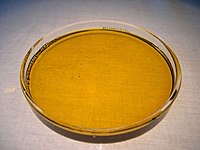Neem oil

Neem oil, also known as margosa oil, is a vegetable oil pressed from the fruits and seeds of the neem (Azadirachta indica), a tree which is indigenous to the Indian subcontinent and has been introduced to many other areas in the tropics. It is the most important of the commercially available products of neem, and its chemical properties have found widespread use as a pesticide in organic farming.
Composition
Uses
Ayurveda
Neem oil has a history of use in
Toxicity
The ingestion of neem oil is potentially toxic and can cause metabolic acidosis, seizures, kidney failure, encephalopathy and severe brain ischemia in infants and young children.[2][4][5] Neem oil should not be consumed alone without any other solutions, particularly by pregnant women, women trying to conceive or children.[2] It can also be associated with allergic contact dermatitis.[6]
Resins
Recently, neem oil has been utilized to prepare various polymeric resins. These resins are used to formulate different types of polyurethane coatings.[7][8]
Pesticide
Formulations that include neem oil have found wide usage as a
Neem extracts act as an antifeedant and block the action of the insect molting hormone ecdysone. Azadirachtin is the most active of these growth regulators (limonoids), occurring at 0.2–0.4% in the seeds of the neem tree.[12]
References
- ^ W. Kraus, "Biologically active ingredients-azadirachtin and other triterpenoids", in: H. Schutterer (Ed.), The Neem Tree Azadirachta indica A. Juss and Other Meliaceous Plants, Weinheim, New York, 1995, pp. 35–88.
- ^ a b c "Neem Oil Monograph". Drugs.com. Retrieved 26 January 2016.
- ^ ISBN 978-90-5702-348-4.
- PMID 24974507.
- PMID 20448012.
- S2CID 39042581.
- ^ Ashok B. Chaudhari, Pyus D. Tatiya, Rahul K. Hedaoo, Ravindra D. Kulkarni, and Vikas V. Gite, Polyurethane Prepared from Neem Oil Polyesteramides for Self-Healing Anticorrosive Coatings, Ind. Eng. Chem. Res. 2013, 52, 10189−10197
- ^ Ashok Chaudhari, Vikas Gite, Sandip Rajput, Pramod Mahulikar, Ravindra Kulkarni, Development of eco-friendly polyurethane coatings based on neemoil polyetherimide, Industrial Crops and Products 50 (2013) 550– 556
- ^ Emken, Tyler (2019-10-25). "Office of Sustainability interns work to heal beloved Fell Arboretum tree". Illinois State University. Retrieved 17 June 2021.
- PMID 16332203.
- PMID 8936291.
- ISBN 978-3527306732
